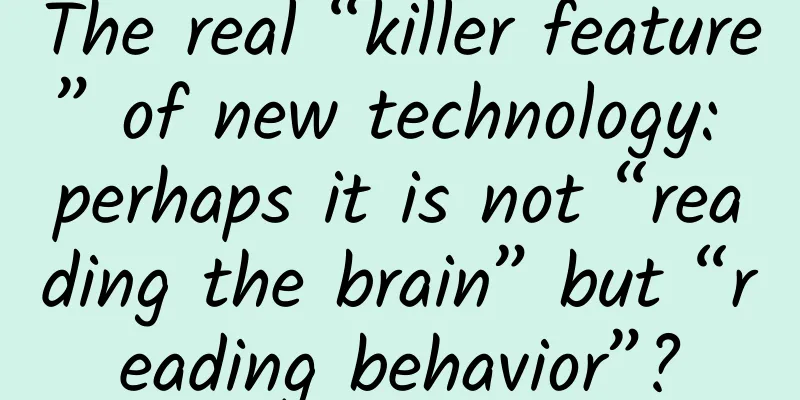The real “killer feature” of new technology: perhaps it is not “reading the brain” but “reading behavior”?

|
When Simon McCarthy-Jones wrote an article about schizophrenia for The Conversation in 2017[1], he joked that it had been read by more than two people, which, as an academic – he is an associate professor of clinical psychology at Trinity College Dublin – was “heartening”. Soon after, however, McCarthy-Jones found himself “grasped in the iron grip of Facebook,” checking again and again to see who had liked his article and who had commented on it. It “grabbed my attention and made me think, ‘Check Facebook! Check Facebook!’ ” he said recently on a video call from his office in Ireland. Was his thinking being secretly coerced by an outside force (in this case, a large tech company)? The experience made him wonder what "free thought" actually is. So he began to wade into the murky worlds of psychology, philosophy, culture, and law, trying to figure out what constitutes a thought and how it can remain truly free. Neuropsychologist Simon McCarthy-Jones argues that thoughts are always spilling out of our heads – whether in the form of a written to-do list or a brainstorm with a friend – so laws protecting free thought must also take into account these important but less internal forms of thinking. © Simon McCarthy-Jones His thinking has gotten out of his head and now appears in a new book: Freethinking: Protecting Freedom of Thought Amidst the New Battle for the Mind. We spoke with McCarthy-Jones, who talked to us about the history of criminalizing “thought crime,” the physical boundaries of thought, and why architecture and urban planning are essential to truly free thought. The subtitle of your new book made me wonder how you would define “the new battle” for our thinking—do you see the current struggle as having multiple fronts? I think there are four aspects to this struggle: threats from states, corporations, and individuals, and threats from the law—in the sense that if the right to free thought is defined very narrowly, we risk leaving a lot of ideas unprotected from new technologies. The last one is a difficult one. We often talk about the impending brain-reading devices. Elon Musk's Neuralink keeps making headlines, and the idea is that he's going to create some kind of brain-computer interface that will allow us to translate our thoughts into a computer. But the question is: how realistic is this technology? Is it a threat that we need to consider right now? I worry that this has the potential to send people into a moral panic. © WIRED I think the more immediate threat from new technologies might not be "brain reading" but what's called "behavioral reading." That is, the idea that by measuring our observable behavior - what we like on Facebook, what websites we visit, what music we like, and so on - and by knowing these facts about us, one can infer our mental states and thus easily understand our behavior. What we're thinking and what buttons we should push to get us to act in a certain way. This knowledge combined with AI technology could pose a really big threat to our autonomy. In some ways, this is new technology that offers a new perspective on an age-old problem. In ancient Greece, people worried about sophists—people who use argument not to find truth but to support certain politicians or political views—and the concern has been around for thousands of years. Now, we see AI as digital sophists, with a huge power imbalance between what it knows about us and how we think—and we’re only mortals. We might want to say: No, we are independent, autonomous thinkers. But I think we have to recognize that when it comes to persuasive AI, we are in deep trouble. Of course, we like to think that, apart from science fiction, what’s inside our skulls remains our last private domain. But you point out that we shouldn’t believe in such fantasies. How then can our free thoughts be protected? When I began to study this problem—as a psychologist rather than a lawyer—two things initially excited me and then frightened me. First, the right to free thought is an absolute right according to the United Nations Universal Declaration of Human Rights[2]. In the United States, it’s almost an absolute right enshrined in the Constitution. This is very exciting because it means that no one can interfere with your freedom of thought. While there are times when you can restrict someone’s speech, such as when it comes to defamation, false advertising, or provocative speech, ideas are invulnerable, and you can create absolute protection for people’s thoughts. However, I began to worry about the power of this right. Because if it is not balanced with other social concerns, it may dominate other social interests. For example, you may think that free thought and free speech are a natural pair, but the problem is that if you claim that someone's speech is manipulating your mind, you may impose new restrictions on speech in the name of free thought. The second, and perhaps more disturbing, thing is the lack of definition of this right. When you look at it, there is nothing. It is actually extremely empty. What's strange is that people throughout the ages - Jefferson, Voltaire, Chomsky - everyone has praised this right. In a sense, we have been too busy praising it to define it, so that although it appears protected, in reality, it is naked, exposed, and very vulnerable. © nautil Letting others think for us means letting others live for us. The United Nations has recently tried to define it in more detail, but do you think they haven’t gone far enough? In 2021, the United Nations released a special report[3] that included four pillars of freedom of thought: immunity means you cannot be punished for your thoughts; integrity means you cannot manipulate the thoughts of others; privacy means you have the right to keep your thoughts private; and imagination means that the state has a responsibility to create an environment of free thought for its citizens. But there are still fundamental questions. Things like: What counts as thought? What allows a thought to be free? How you answer these questions will profoundly affect how much you actually protect thoughts, or how many of your thoughts are vulnerable and unprotectable. Does this also in some way protect – as Descartes’s “I think, therefore I am” suggests – our own personhood, even our autonomous existence? Yes, I think the mind allows us to distance ourselves from the world so that we can have this private business space where we can make plans, intentions, not have to think about what the outside world is asking of us, be fully reflective, and control our behavior from within. So I do think it plays a central role in our autonomy. But through Descartes we implicitly accept the idea that thoughts are what happens inside the mind. I've seen a lot of legal writing about this where people talk about protecting the inner world, which they call forum internum. © Glas Koncila I don't think that can be all we need to protect. I think protecting only the right to free thought in our inner world would give up more than it would save—because so much of our thinking happens outside of our heads. As philosophers, technologists and psychologists say, it’s this important external thinking that we need to protect: the thinking we do when we count on our fingers, make shopping lists, think through technology (like when we Google it), and communicate our thoughts to each other through language. People would rather subject themselves to electric shocks than sit quietly alone with their thoughts. Is this what you mean by "thought speech"? Yes, even though it takes the form of speech, it is actually our thinking with others. As EM Forster said, “How do I know what I think until I see what I say?” When we talk to others, it is likely that we are thinking with them. There’s a body of psychological research that shows that, under the right conditions, we’re more likely to get closer to the truth when we think as a group than when we think as individuals. Psychological research also shows that in order to have the best chance of getting closer to the truth, you need to have a group of people with different ideas in a room. So the key is to create those spaces. During the Enlightenment, there were coffee shops all over Europe where you could have these kinds of debates – although obviously they weren’t an inclusive space that could bring in multiple perspectives. Now the question is: how do you get that diversity of perspectives? Obviously, we have online spaces now. But unless you’re rich or reckless — or both — it’s very difficult to speak freely in these spaces. If we don’t make people feel safe in these spaces, they won’t speak freely, and you’ll be even less likely to get close to the truth. The idea of protecting this way of thinking eventually led you to… urban planning? I was talking to a colleague from Brazil at a conference, and he told me that the design of their capital, Brasilia, was intentionally done by planners to try to avoid street corners - because street corners are places where people can gather and think about things together, which could be threatening to the ruling regime. So urban planning can have an important impact on the public's ability to think together. © International Center of Photography It's also about things that promote free speech. So it's also about ecological design, the idea that walking through green spaces helps you think. Or maybe things that help us design libraries - which used to be dark, dusty places - now they're more about light and spaces for group conversation. So it's designing buildings and spaces to promote shared thinking. Of course, we now live in a digital world that might not be so conducive to this kind of free thinking, right? The United Nations states that we should have the right to unmanipulated thoughts. But we have all had experiences where our attention has been diverted. Not to mention the spread of bizarre ideas like the QAnon conspiracy theory **** on the internet. Is there a way out? Or have we already failed? There is a way to design technology products that, rather than algorithmically nudge us in the direction we’re already headed, have a default mode with more “free-thinking” options that give us a greater diversity of perspectives. This would help address the problem Donald Rumsfeld talked about — the “unknown unknowns,” the things we don’t even know we don’t know. It might also help to disprove what some people call “conventional beliefs” — ideas that we acquired at some point but never really thought about. As a rather heavy example, you might mention democracy, a concept that I think many of us accept as a perfectly good thing. But have we arrived at that belief ourselves? Have we actually heard the arguments against democracy to the point of no longer believing in its benefits, or really understand why we believe in it? In reality, it's hard to significantly improve your night vision by eating enough carrots. Our bodies don't convert beta-carotene into vitamin A very efficiently, so even eating lots of carrots won't help as much as taking a vitamin supplement. © Atlas Obscura Here's a more trivial example: I've always believed that eating carrots can help you see better in the dark. Apparently, carrots contain beta-carotene, which can improve your vision to some extent if you're severely deficient in it. But during World War II, the British were secretly building airborne intercept radars, but they didn't want the Germans to know. So they had to come up with an excuse to explain why these British pilots were shooting down so many German planes in the dark. So they announced that the British pilots were eating a lot of carrots. It just became part of the culture. So how can we figure out what we believe for the wrong reasons? To what extent are we still human if we sacrifice our ability to think? When it comes to free thought, one cannot help but mention George Orwell’s book 1984, published in 1949. Even decades before that – in the 1920s and 1930s – in real life, Japan’s then-ruling government enacted laws criminalizing “thought crimes” in an attempt to suppress dissent. Is there a situation where free thought should be questioned, as you mentioned before, what if it is abused to prevent free speech? This is a controversial area - whether there is any reason to restrict thought. At present, it is an absolute right. We have an Orwellian knee-jerk reaction to the idea of "thought crime". But philosopher Sam Harris has talked about the possibility of creating "enforced confession zones" with the help of brain-reading devices that reliably detect lies. In court, for example, you might be asked to wear such a device to detect whether you are lying. On the one hand, this would be an unwarranted intrusion on free thought. But would social opinion say that this is acceptable in that space? I like this sentence in your book: "To let others think for us is to let others live for us." Is this the key point of the problem for you? This is what makes us unique as a species. We may not have sharp teeth and claws, but we have the ability to think. Our ability to survive in this world is to think, and it is a big part of what makes us human. If we sacrifice our ability to think, then to what extent are we still human? But at the end of the day, we don’t actually think very often, right? Humans evolved to conserve energy, and thinking takes a lot of energy. In fact, you mention a series of studies[4] that found that people would rather give themselves electric shocks than sit quietly alone for six to 15 minutes and think. As a psychologist, is this surprising to you, or is it not surprising? Daniel Kahneman, a Nobel Prize winner, famously said, “Humans are to independent thinking what cats are to swimming. They can do it, but they prefer not to.” Daniel Kahneman (1934-), born in Tel Aviv, British Mandate Palestine, is an Israeli-American psychologist. He won the 2002 Nobel Prize in Economics for his contributions to prospect theory. © Richard Saker/The Observer In my own life, sometimes I really don’t want to think! And technology makes it easy. YouTube, for example, provides us with a vast amount of information. You might think this would be helpful for thinking. But are we sometimes using YouTube as a digital benzodiazepine, just as we use it to relieve anxiety? In the old days - the old days for us - when you washed the dishes or mowed the lawn, you had time to think. These days, we seem to be doing these tasks more and more with headphones, YouTube and podcasts. So, is this indoctrination helping us think, or is it preventing us from thinking for ourselves by importing other people's thoughts every day? The question is: How do we rediscover the joy of thinking? How do we enjoy the process of thinking? If we don’t really want to think anymore, then there’s no point in building a society that makes us do things we don’t want to do, right? What changes have you made in your life to help protect the ability to think more freely? The first thing I did was to get off all forms of social media. This may be an overreaction! I understand that Twitter can be a great source of new ideas. But there is a balance between it grabbing your attention and distracting you from your goals. For me, it does more harm than good. I also think it's easy to point the finger at social media and say it's the culprit for my attention being diverted. But we also need to look at who is behind all of this. It could be our own vanity or ego that leads us into these social media "like" traps. So I think instead of putting the blame squarely on social media, maybe we also need to look at our own motivations and where we try to get our self-esteem from and try to manage ourselves more effectively. © nautil Another thing I did was add other kinds of thinking. As an academic, it’s easy to shut yourself in a room with a paper or a book and think that’s the best way to make progress. But when I saw all the research showing [5] how valuable it is to think with others, and how much we can improve our thinking by talking to others, it forced me—as an introvert—to try to engage with others more, to have different kinds of conversations in spaces that are conducive to free thought, to talk to people you trust in a safe environment where you can challenge your own ideas with diverse perspectives. There is also quite a bit of research linking thinking to walking - especially in nature. So I try to think actively on the move and get out for more walks. Of course, in doing this, I am following in the footsteps of many philosophers and psychologists. No podcasts or music during my walks. Yes, leave your headphones at home. By Katherine Harmon Courage Translation/Yuba and Thin Bamboo Proofreading/tim This article is based on the Creative Commons License (BY-NC) and is published by Yuzhu and Shouzhu on Leviathan The article only reflects the author's views and does not necessarily represent the position of Leviathan |
<<: Cosmic Bullying: How Do Big Stars Snatch Up Planets?
Recommend
The latest research found that "Sugar oranges can no longer be eaten"? The truth...
Rumor: "'The latest research shows that ...
The giants are attacking: Will mobile search change?
After UC and Alibaba jointly launched Shenma, Sog...
Why do chickens lay eggs every day? Won't they get angry if their eggs are taken?
Chickens, as a kind of poultry that often appears...
Sales strategy everyone needs to learn: Sell everything you want to sell
Wang Gang is a practical elite with annual sales ...
Learn these 5 operational thinking from Zhang Xiaolong’s public speeches
At the WeChat Leadership Conference that just end...
Aiti Tribe Stories (34): Self-cultivation of a full-stack engineer
[51CTO.com original article] Shi Yafeng is a full...
How to make users feel that your app loads quickly
Editor's note: The author of this article, Ni...
Case study: How to conduct competitive analysis on the current mainstream food delivery apps?
In order to gain a deeper understanding of the fe...
5 ways for the elderly to use health codes even without smartphones
As the epidemic prevention work deepens, for many...
APP operation: 8 rules to help you quickly find promotion shortcuts
The eight golden rules introduced in this article...
Summary of the channel characteristics of advertising on Momo, iQiyi, Kuaishou, etc.!
What are the characteristics of information flow ...
AI makes mobile phone tasks run automatically! The latest research from Chinese universities simplifies the operation of mobile devices
AI liberates the hands of carbon-based organisms ...
Who is suitable for taking a nap? Why do some people feel dizzy when they wake up, while others feel relaxed?
"I can't remember how long it has been s...
The “traffic pool” of programmatic advertising: SSP
The SSP platform is an advertising platform that ...









